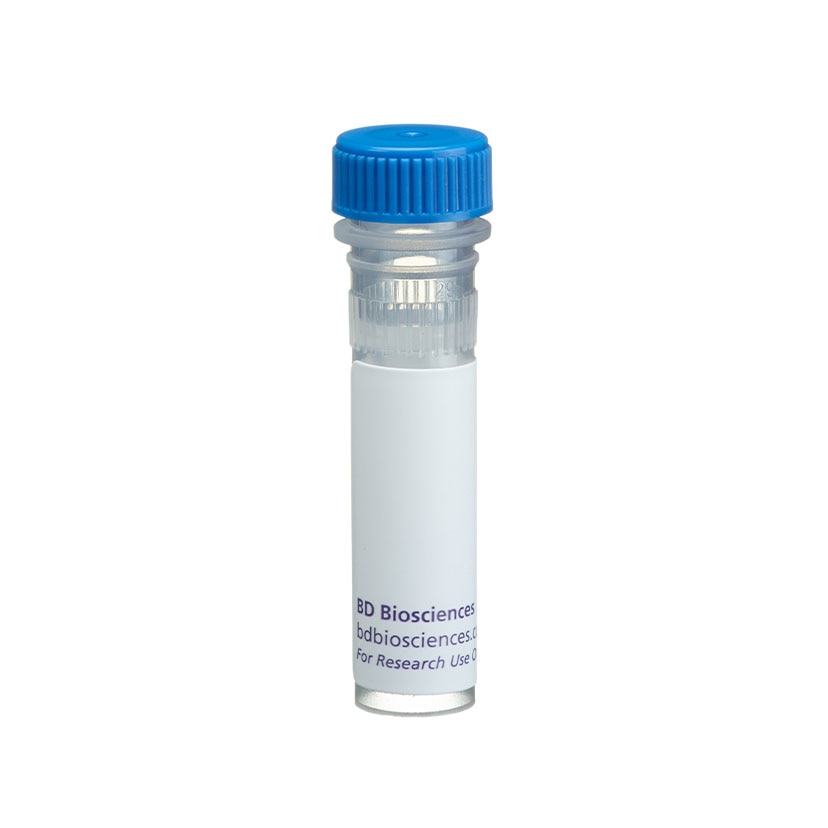-
Reagents
- Flow Cytometry Reagents
-
Western Blotting and Molecular Reagents
- Immunoassay Reagents
-
Single-Cell Multiomics Reagents
- BD® OMICS-Guard Sample Preservation Buffer
- BD® AbSeq Assay
- BD® Single-Cell Multiplexing Kit
- BD Rhapsody™ ATAC-Seq Assays
- BD Rhapsody™ Whole Transcriptome Analysis (WTA) Amplification Kit
- BD Rhapsody™ TCR/BCR Next Multiomic Assays
- BD Rhapsody™ Targeted mRNA Kits
- BD Rhapsody™ Accessory Kits
- BD® OMICS-One Protein Panels
- BD OMICS-One™ WTA Next Assay
-
Functional Assays
-
Microscopy and Imaging Reagents
-
Cell Preparation and Separation Reagents
Old Browser
This page has been recently translated and is available in French now.
Looks like you're visiting us from {countryName}.
Would you like to stay on the current location site or be switched to your location?
BD Transduction Laboratories™ Purified Mouse Anti-ILK
Clone 3/ILK (RUO)




Western blot analysis of ILK on Hs68 cell lysate. Lane 1: 1:1000, lane 2: 1:2000, lane 3: 1:4000 dilution of anti-ILK antibody.



Regulatory Status Legend
Any use of products other than the permitted use without the express written authorization of Becton, Dickinson and Company is strictly prohibited.
Preparation And Storage
Product Notices
- Since applications vary, each investigator should titrate the reagent to obtain optimal results.
- Please refer to www.bdbiosciences.com/us/s/resources for technical protocols.
- Caution: Sodium azide yields highly toxic hydrazoic acid under acidic conditions. Dilute azide compounds in running water before discarding to avoid accumulation of potentially explosive deposits in plumbing.
- Source of all serum proteins is from USDA inspected abattoirs located in the United States.
Integrins are transmembrane receptors that mediate cell-cell or cell-matrix adhesion. All integrins are heterodimers composed of α and β subunits, which interact with extracellular matrix and cytoskeletal proteins. Signal transduction through intergin receptors may be regulated by integrin-linked kinase (ILK). ILK is a widely expressed Ser/Thr protein kinase that contains four ankyrin-like repeats in the N-terminal region, a phoshoinositide lipid-binding motif at amino acids 180-212, and an integrin binding site at amino acids 293-451. The ankyrin repeats interact with a LIM domain-only protein called PINCH that also binds the adaptor protein, Nck-2. This interaction implicates ILK in growth factor receptor pathways. In addition, the interaction of ILK with the cytoplasmic domains of integrin β1 and β3 subunits and localization of ILK to focal adhesion plaques suggests a role for ILK in the regulation of cell adhesion. Interestingly, overexpression of ILK in epithelial cells inhibits cell adhesion and stimulates cell cycle progression and tumorigenicity. Thus, ILK regulates signal transduction in many different cell signaling pathways.
This antibody is routinely tested by western blot analysis. Other applications were tested at BD Biosciences Pharmingen during antibody development only or reported in the literature.
Development References (4)
-
Delcommenne M, Tan C, Gray V, Rue L, Woodgett J, Dedhar S. Phosphoinositide-3-OH kinase-dependent regulation of glycogen synthase kinase 3 and protein kinase B/AKT by the integrin-linked kinase. Proc Natl Acad Sci U S A. 1998; 95(19):11211-11216. (Biology). View Reference
-
Hannigan GE, Leung-Hagesteijn C, Fitz-Gibbon L, et al. Regulation of cell adhesion and anchorage-dependent growth by a new beta 1-integrin-linked protein kinase. Nature. 1996; 379(6560):91-96. (Biology). View Reference
-
Nikolopoulos SN, Turner CE. Integrin-linked kinase (ILK) binding to paxillin LD1 motif regulates ILK localization to focal adhesions. J Biol Chem. 2001; 276(26):23499-23505. (Clone-specific: Immunofluorescence, Western blot). View Reference
-
Persad S, Attwell S, Gray V, et al. Inhibition of integrin-linked kinase (ILK) suppresses activation of protein kinase B/Akt and induces cell cycle arrest and apoptosis of PTEN-mutant prostate cancer cells. Proc Natl Acad Sci U S A. 2000; 97(7):3207-3712. (Biology). View Reference
Please refer to Support Documents for Quality Certificates
Global - Refer to manufacturer's instructions for use and related User Manuals and Technical data sheets before using this products as described
Comparisons, where applicable, are made against older BD Technology, manual methods or are general performance claims. Comparisons are not made against non-BD technologies, unless otherwise noted.
For Research Use Only. Not for use in diagnostic or therapeutic procedures.